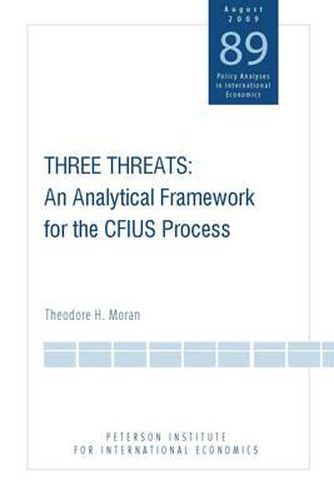Readings Newsletter
Become a Readings Member to make your shopping experience even easier.
Sign in or sign up for free!
You’re not far away from qualifying for FREE standard shipping within Australia
You’ve qualified for FREE standard shipping within Australia
The cart is loading…






Under what conditions might a foreign acquisition of a US company constitute a genuine national security threat to the United States? What kinds of risks and threats should analysts and strategists on the Committee on Foreign Investment in the United States (CFIUS), as well as their congressional overseers, be prepared to identify and deal with? This study looks at three types of foreign acquisitions of US companies that may pose a legitimate national security threat.
The first is a proposed acquisition that would make the United States dependent on a foreign-controlled supplier of goods or services that are crucial to the functioning of the US economy and that this supplier might delay, deny, or place conditions on the provision of those goods or services. The second is a proposed acquisition that would allow the transfer to a foreign-controlled entity of technology or other expertise that might be deployed in a manner harmful to US national interests. The third potential threat is a proposed acquisition that would provide the capability to infiltrate, conduct surveillance on, or sabotage the provision of goods or services that are crucial to the functioning of the US economy. This study analyzes these threats in detail and considers what criteria are needed for a proposed foreign acquisition to be considered threatening. Ultimately, the vast majority of foreign acquisitions pose no credible threat to national security on these grounds.
$9.00 standard shipping within Australia
FREE standard shipping within Australia for orders over $100.00
Express & International shipping calculated at checkout
Under what conditions might a foreign acquisition of a US company constitute a genuine national security threat to the United States? What kinds of risks and threats should analysts and strategists on the Committee on Foreign Investment in the United States (CFIUS), as well as their congressional overseers, be prepared to identify and deal with? This study looks at three types of foreign acquisitions of US companies that may pose a legitimate national security threat.
The first is a proposed acquisition that would make the United States dependent on a foreign-controlled supplier of goods or services that are crucial to the functioning of the US economy and that this supplier might delay, deny, or place conditions on the provision of those goods or services. The second is a proposed acquisition that would allow the transfer to a foreign-controlled entity of technology or other expertise that might be deployed in a manner harmful to US national interests. The third potential threat is a proposed acquisition that would provide the capability to infiltrate, conduct surveillance on, or sabotage the provision of goods or services that are crucial to the functioning of the US economy. This study analyzes these threats in detail and considers what criteria are needed for a proposed foreign acquisition to be considered threatening. Ultimately, the vast majority of foreign acquisitions pose no credible threat to national security on these grounds.